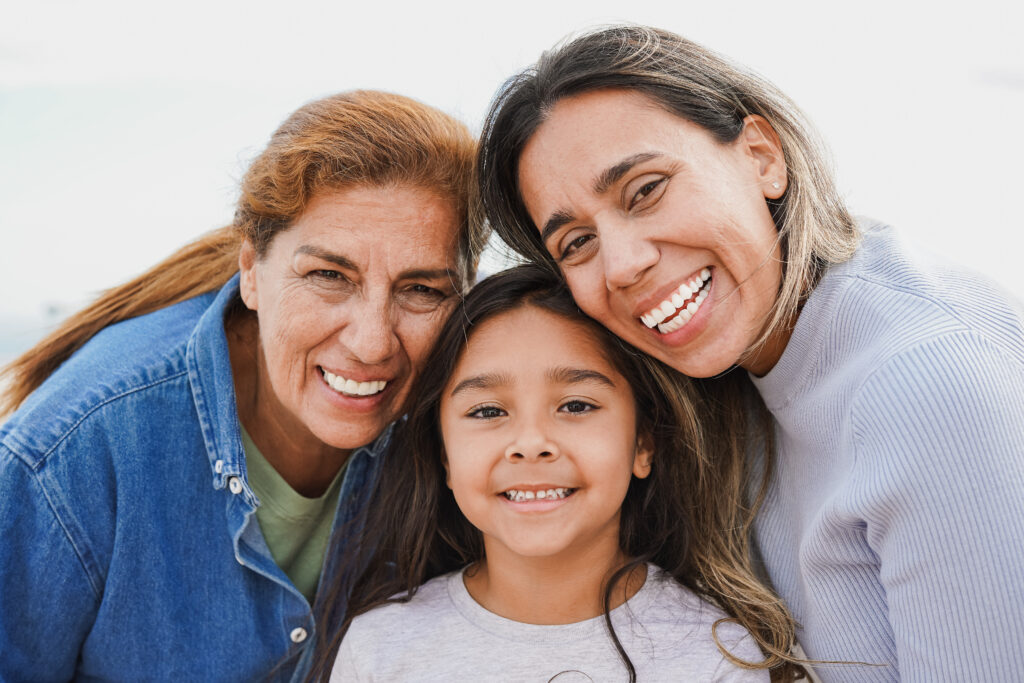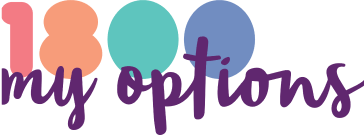
Family relationships for older women
Family, in whatever form it takes, plays an important role in our lives. It can give us a sense of meaning and purpose, which can grow increasingly vital to our wellbeing as we age.
As we grow older, family dynamics can change. Children may move out, leading to a sense of an ’empty nest’, as well as reduced stress and fewer daily responsibilities. Many people appreciate the newfound freedom that comes with this stage of life – it can give us more time to spend on social activities and relationships.
For some, family relationships can also become more complicated as we age. Long-standing relationships may change – sometimes improving, sometimes ending, or moving into a caregiving role (see Caregiving). New partners can mean new blended families, and these can add additional layers to family life (see Relationship dynamics).

We know from both research and personal experience that the quality of family relationships, including both the support we give and receive (like love, advice, and care) and the strains we might experience (such as disagreements or criticism), plays a key role in our wellbeing.
It is heartening to note that older adults generally report having better relationships with their children, more positive marriages or partnerships, closer friendships, and a larger number of overall happier relationships compared to middle-aged or younger adults.
Changing intergenerational relationships
Throughout our lives, different members of our family, such as grandparents, parents, and children, have a unique way of supporting and caring for one another. This dynamic can foster deep bonds, but it can also introduce challenges. The strength and quality of these relationships play a crucial role in the happiness and wellbeing of each generation.
As time progresses, and as we age, these roles can change significantly. Adult children may find themselves in positions where they offer more support to ageing parents. This transition, while natural, requires sensitivity. It is essential to strike a balance: adult children want to be able to help, while parents may want to maintain their independence and sense of purpose.
As we age, we may also find ourselves continuing to support our adult children, especially if they face health challenges or have a disability (see Caring for family members with disability). Grandparents often step in to help with looking after grandchildren.
These connections can be deeply enriching for everyone, but if childcare responsibilities become too much, it might lead to stress and friction in relationships (for more on this, see Caring for grandchildren).
This video, by the organisation Respect Victoria, discusses what a family relationship based on respect and trust can look like. Their website contains other videos and useful information on this and other topics.
Some research shows that women and men see these multi-generational bonds differently. Women tend to be more involved with and affected by intergenerational relationships, and adult children tend to feel a stronger connection to their mothers. A mother’s sense of wellbeing is often more deeply linked to the quality of relationships with her children than it is for fathers. (This isn’t always the case though – every relationship is unique.)
Want to learn more? These resources on family relationships may help
- Relationships Australia has a presence in each state and territory and has links to services and resources for older adults.
- Learn about six important roles that an older family member can play on this page on the Nurse Next Door website.
- Grandparents Australia is an advocacy group that promotes and raises awareness of the interests and needs of grandparents and grandchildren.

Elder abuse
Elder abuse is when someone deliberately hurts or takes advantage of an older person. It’s often done by someone the older person knows and trusts, like a family member or a helper, and usually involves a relationship where that family member or helper has more power than the older person. (For a more detailed definition, you can visit the Australian Institute of Family Studies‘ page on elder abuse.)
Elder abuse can include not taking care of an older person properly, taking their money, hurting them physically, including sexual abuse, or speaking abusively to them.
Sometimes, people might act poorly towards older people because of ageist attitudes. Ageism is discrimination or prejudice against someone because of their age. It can affect both young and older people. Just as racism and sexism promote negative stereotypes based on race or gender, ageism does the same based on age.
A person might think older people are less important or treat an older person badly because they find it hard to look after them. But there’s never an acceptable reason for ageism or elder abuse.
The 2021 National Elder Abuse Prevalence Study is the largest study of elder abuse among adults living in Australia to date. It found that about 15 out of 100 older people had been harmed this way in 2021. Most often, family members were responsible, especially adult children or their children’s partners, and even grandchildren. Sometimes, partners were responsible for elder abuse.
If you think this might be happening to you or someone you know, it can be confusing, especially when family are involved. Sometimes, neither the victim nor perpetrator realise that what is happening is abuse.
The video above gives a clear explanation of what elder abuse is (and it’s also available in other languages). There are places that can help and offer advice that are listed below.
And the video below by Respect Victoria provides an example of how elder abuse can happen within a family. On their website they also give suggestions on how you can talk about elder abuse, or where to go for help.
Want to learn more? These resources on elder abuse may help
- The Australian Government’s website on Protecting the Rights of Older Australians is a good place to start for information, advice and resources.
- If you are concerned about elder abuse, Senior Rights Victoria and the National Elder Abuse phone line have information and support.
- You can also visit the Australian Human Rights Commission website and the The Elder Abuse Knowledge Hub for further information.
- You can also call 1800 ELDERHelp (1800 353 374) – a free call to link you to information and advice in your state or territory.
Choi NG, Ha JH (2016) Relationships between spouse/partner support and depressive symptoms in older adults: Gender difference. Aging and Mental Health Aging Ment Health 15(3), 307–317.
Ewings SJ (2019) Unique challenges facing older Australian women in the early twenty-first century. The University of Sydney.
Farrugia T, Hewitt A, Bourke-TH, Joosten A (2019) The impact of carer status on participation in healthy activity and self-reported health among Australian women over 50 years. Australian Occupational Therapy Journal. 66(1): 23–32.
Feldman S, Radermacher H (2019) Vital conversations: giving older women in greater Melbourne a voice. Lord Mayor’s Charitable Foundation, Melbourne.
Fuller H, Pikala T, Mullen A (2022). Strengthening late-life family connections. North Dakota State University.
Guven S, Sener A (2010). Family relations in aging. International Journal of Business and Social Science 1(3).
Haslam C, Dane S, Lam BCP, Jetten J, Liu S, Gallois C, et al. (2022) Ageing well in a foreign land: group memberships protect older immigrants’ wellbeing through enabling social support and integration. Ageing And Society. 42(7), 1710-1732.
Lixia Q, Kaspiew R, Carson R, De Maio D, Harvey J, Horsfall B (2021) National elder abuse prevalence study: Final report . Australian Institute of Family Studies.
Luong G, Charles ST, Fingerman KL (2011) Better with age: Social relationships across adulthood. Journal of Social and Personal Relationships 28(1), 9–23.
Mohanty I, Niyonsenga T, Cochrane T. et al. (2020) A multilevel mixed effects analysis of informal carers health in Australia: the role of community participation, social support and trust at small area level. BMC Public Health. 20(1801).
MCWH (2021) Submission into the Inquiry into Support for Older Victorians from refugee and migrant backgounds. Multicultural Centre for Women’s Health, Melbourne.
Pope ND (2022) Older women caring for others and needing care. Journal of Women and Ageing 34(6), 687-691.
Sharma N, Chakrabarti S, Grover S (2016) Gender differences in caregiving among family - caregivers of people with mental illnesses. National Centre for Biotechnology Information.
Thomas PA, Liu H, Umberson D (2017) Family relationships and well-being. Innovation in Ageing 1(3).





